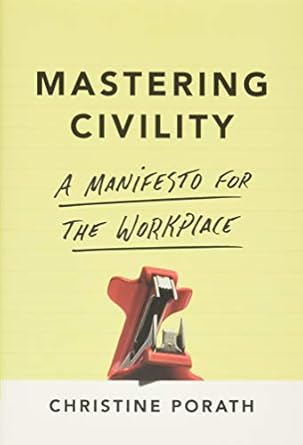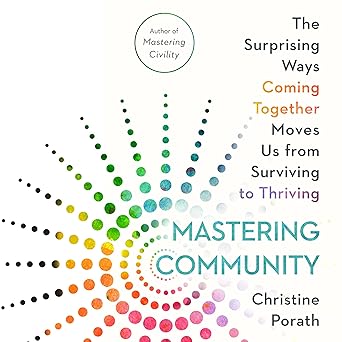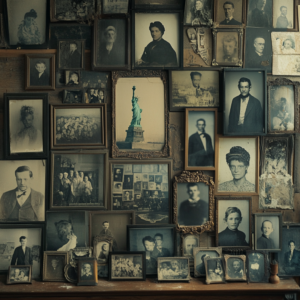It’s not just your imagination: rudeness is increasingly prevalent, both in public and professional spaces, Porath’s research shows why fostering a culture of civility at work is essential for personal well-being, team cohesion, and organizational success. Civility isn’t just a nice-to-have; it’s a must-have for any thriving community or workplace.
The Personal Impact of Incivility

Some insights for this piece are credited to:
Mastering Civility: A Manifesto for the Workplace
by: Christine Porath
Click here for free Audiobook (with trial)
Incivility has immediate and long-lasting effects on individuals. In the short term, it can hijack the amygdala—the brain’s emotional center—triggering an overwhelming flood of emotions. This “fight or flight” response can make it difficult for individuals to think clearly or respond effectively, akin to a “storm inside your brain” that clouds focus and attention (Porath).
For example, Porath’s research found that people exposed to incivility are five times less likely to notice important details, such as a gorilla walking through the frame in a video experiment. They also take about 30% longer to solve problems, create words, or make physical responses. Incivility, in essence, slows us down, dulls our cognitive function, and undermines our effectiveness.
In the long term, the damage lingers even more deeply. Incidents of rudeness or disrespect can stay with individuals for years or even decades, negatively impacting memory, creativity, and emotional health. Porath shares examples of people who vividly recalled incidents of being belittled or dismissed many years later—one involving a concession stand interaction 17 years prior, and another dating back to 1988. These lasting scars serve as reminders that even seemingly minor acts of incivility can have a profound impact on individuals’ emotional and psychological well-being.
Exposure to rudeness also hampers creativity. Porath’s research shows that people who experience incivility struggle to come up with creative solutions and are more prone to making errors. As creativity and innovation are key drivers of success in today’s fast-paced work environments, the cost of incivility is enormous.
The Organizational Impact of Incivility
The ripple effects of incivility extend beyond individual performance and affect the organization as a whole. When employees experience or witness rude behavior, it can significantly erode their loyalty and commitment. Porath found that 12% of people who experience incivility end up leaving their jobs as a direct result. Moreover, customers who witness incivility between employees are far less likely to return to that business. A single incident of rude behavior can therefore have long-term repercussions for a company’s reputation and bottom line.
Trust and collaboration are also casualties of workplace incivility. Seeing rudeness not only diminishes trust in the individual perpetrator but also creates a sense of insecurity and distrust within the broader team or organization. This reluctance to trust can manifest in employees being less willing to speak up, share ideas, or collaborate—behaviors that are essential for high-performing teams.
Perhaps most concerning is the impact of incivility on critical tasks such as patient care in healthcare settings. Porath’s study of surgical teams in Israel found that rudeness led to worse diagnostic and procedural outcomes. Teams that experienced incivility were less likely to share information or seek help from one another, and they became less flexible in considering alternative patient treatments. In high-stakes environments where every decision matters, the cost of incivility is not just poor performance, but potentially life-threatening mistakes.
Addressing Incivility: The Role of Self-Awareness and Feedback
A significant barrier to creating a culture of civility is a lack of self-awareness. While most people (95%) believe they are self-aware, Porath’s research suggests that only 10-15% of individuals truly are. This means that many of us have “blind spots” when it comes to how our behavior affects others.

Highly Recommended:
Insight: Why We’re Not as Self-Aware as We Think
by: Tasha Eurich
Click Here for free audiobook with trial
One strategy for increasing self-awareness is engaging in what Porath calls a “Dinner of Truth.” This involves sitting down with a trusted friend or colleague and asking them to candidly share one of your most annoying habits or behaviors that might be hurting others. This practice can offer valuable insights into areas for personal growth and civility.
Beyond feedback, coping strategies like “self-distancing”—stepping back to view a situation as if watching a movie—can help individuals avoid being emotionally hijacked by incivility. Focusing on “thriving” activities, which make people feel energized and capable, also builds resilience against the toxic effects of rudeness.
Creating a Culture of Civility
The antidote to incivility is clear: fostering a culture of respect, trust, and open communication. As Porath notes, “Civility lifts people, whereas incivility holds people down.” When employees feel respected and valued, they are more likely to be healthier, more productive, and more creative. They can thrive both personally and professionally.
One of the most effective ways to build a culture of civility is by practicing “radical candor”—the art of being clear and direct, while also caring deeply about others. This balance ensures that feedback is constructive rather than destructive, and that people feel supported rather than attacked.
Modeling respectful behavior is another essential step. Leaders, in particular, play a pivotal role in setting the tone for civility. Acknowledging mistakes and showing vulnerability can help create an environment where people feel safe to speak up and offer feedback. Building strong relationships rooted in trust and psychological safety is key to creating a workplace where people feel empowered to be honest and respectful.

The Editors Highly Recommend:
In her book Mastering Community: The Surprising Ways Coming Together Moves Us from Surviving to Thriving, Christine Porath emphasizes the profound effects of civility—and the damage caused by incivility—on individuals and organizations.
The Power of Civility in the Workplace
Creating a culture of civility is not just about avoiding rudeness—it’s about fostering an environment where people feel valued, respected, and empowered to thrive. The effects of incivility are far-reaching, from immediate emotional distress to long-term damage to trust, collaboration, and performance. But the solution lies in something simple yet powerful: respect.
When organizations invest in building respectful cultures, they unlock the potential of their teams. Employees are more likely to be innovative, collaborative, and committed when they work in an environment that prioritizes civility. As Porath eloquently states, “We will be healthier, more productive, and lead more fulfilling lives when we are civil.” A culture of civility allows individuals and organizations to move from merely surviving to truly thriving.





